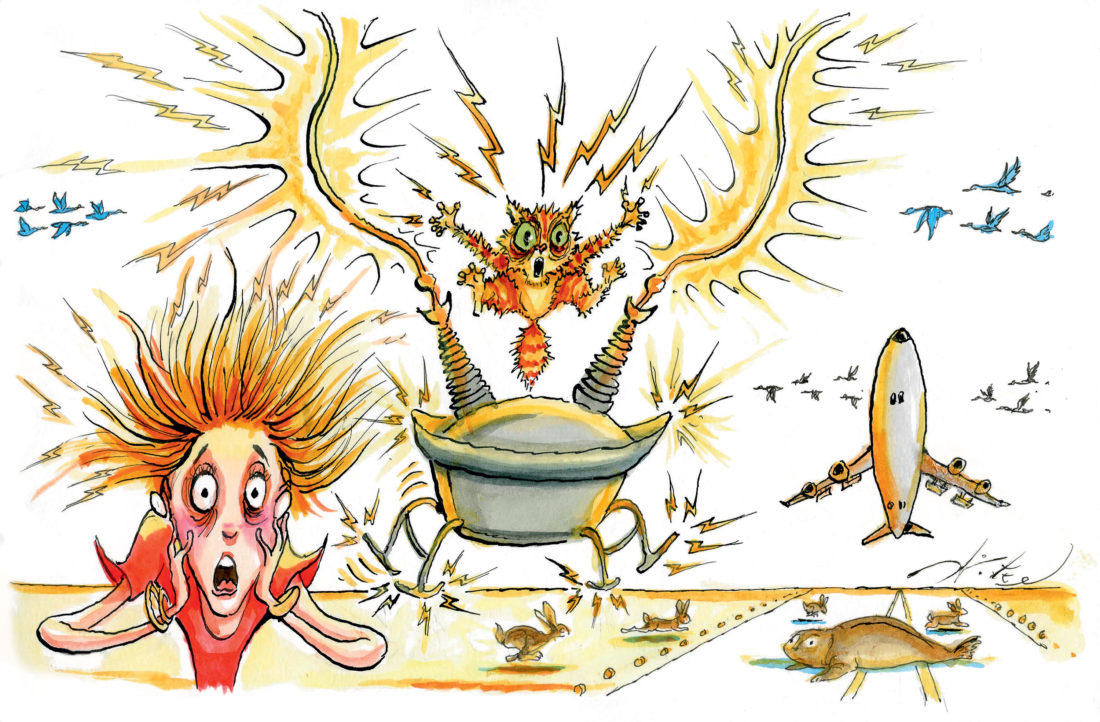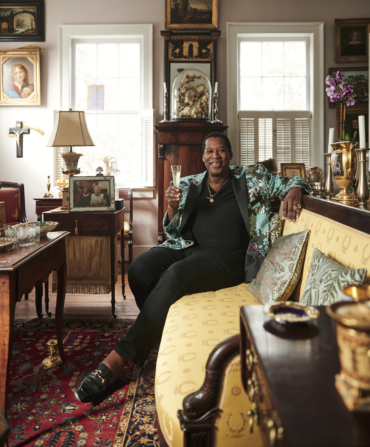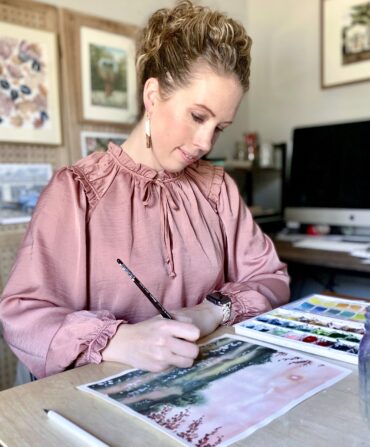This past September, while the temperature hovered in the high nineties and the humidity was its usual unbearable self, 7,556 homes in New Orleans lost power after a cat wandered into a substation at 8:30 in the morning and caused a flash by touching the equipment. Entergy New Orleans claimed to have installed “protective devices” to keep cats out, but apparently it does not know the wily ways of the feline race. Since I was not among the thousands without power, naturally I felt most sorry for the cat. In a tweet, Entergy said, “When this happens, the animals unfortunately do not survive the high-voltage contact.” And there you have it: one more reason to despise power companies.
While it pains me to say anything even remotely in this particular company’s defense, cats have been known to wreak a little havoc. When I was in college in Washington, D.C., I adopted a kitty from my beloved Newsweek colleague and Georgetown neighbor Jane Whitmore. Jane and her two daughters had taken in a stray they named Bob and then Bob surprised everyone by turning out to be Bobbie Jo and pretty much immediately giving birth to a litter of kittens. The one I chose, Sam, was the bruiser of the bunch—one of his siblings had died in infancy because Sam hogged all his mother’s milk. I picked him up without a crate—we had maybe a two-minute drive and I figured I could hold him in my lap. Wrong. By the time we made it home, my favorite silk blouse looked like one of those multi-tailed kites blowing in the wind.
As a kitten, Sam woke me up each morning by jumping on my chest of drawers and knocking over, one by one, every antique cut-glass bottle that I’d painstakingly collected from London’s Portobello Road until I got up and fed him. Closing the door was not an option. He simply got a running start and hurled his entire bulk against the door, creating a sonic boom more powerful than any alarm clock. And his bulk was not insignificant. He weighed thirty-five pounds and had an enormous handsome head and long black hair, which made him seem even more massive than he was. Such was his appearance that when Sam and I lived in Orlando, Florida—in a house with a jalousie glass front door—the Orkin man mistook him for a bear. He was a new guy, so when he called me at work to say he couldn’t go in the house, I figured he didn’t know where the key was hidden. “No ma’am,” he said, “it’s not that. There’s a bear cub loose in your living room.”
I was proud that Sam was such a notable—and noble—beast. I had my friend the great painter John Alexander capture his lordly beauty in a portrait just before he died, after twenty years of loyal and entertaining companionship. I loved Sam and I am crazy about cats in general. So I was happy for my mother when she called to tell me she had acquired one of her own. (She had already nixed another dog, saying she could not repeat the trauma of the demise of our last yellow Lab, Bo, ever, ever again.) But that was before I met the cat, to whom, rather irritatingly, she gave the late, great Sam’s name.
The luckiest day of Sam II’s life was the day he decided (wisely—cats have scary good intuition) to wander up our long gravel drive and into the loving arms of my supercompassionate mother. (She once almost killed us all braking for a butterfly. “They have such short lives already,” she said after we wound up in the ditch.) He weighed almost nothing, he’d been chewed on by some critter or other, and he was skittish as all hell. The plan had been to clean him up and give him the run of the air-conditioned utility room outside. But that was before the discovery that he was afflicted with feline immunodeficiency virus, otherwise known as feline AIDS. The cat immediately became ruler of the house. In the summer, so that her prized pet could still enjoy some semblance of the outdoors, my mother opened every single screened window, which meant the thermostat was set to something like thirty-two degrees. Further, every morning, to this day, he gets newly washed and ironed six-hundred-thread-count pillowcases on all the numerous spots where he likes to lounge. Now, I have known and loved my mother all my life, so not a bit of this stuff surprised me. The cat, she said, had lifted her from her depression (which none of us knew she had); the cat could do whatever he wanted. The only thing she could not allow him to do was be in the presence of my sainted dog, Henry.
This was sort of a deal breaker. I go home a lot; Henry likes to go with me. My mother, dead serious, informed me that the mere sight of the dog would give the cat a fatal heart attack. She actually tried putting those words in the vet’s mouth, but again, I’ve known my mother all my life, and I know the vet well enough to know that he would not in fact make such a pronouncement. Still, when Mama has a theory, it is ironclad even if it’s a tiny bit insane. Finally, after two years, I decided it was way past time to test it. As soon as I let Henry in the kitchen door, the cat not only did not have a heart attack, he pounced on my poor, peace-
loving pup and beat him over the head with his paws. When Henry finally escaped and ran yelping for safe harbor beneath the living room sofa, the cat followed and commenced beating him some more. Since Sam II is clearly going to live forever (he has far better health care than the great majority of this country’s human citizenry), there was nothing to do but build what is essentially the most expensive doghouse in the Mississippi Delta, now almost at completion. Henry and I both need a safe place to sleep.
I have to admit that cats, even those not allowed outside, do possess several useful traits in addition to being mood lifting and extremely entertaining
Much as Sam II might irritate me, I have to admit that cats, even those not allowed outside, do possess several useful traits in addition to being mood lifting and extremely entertaining (as evidenced—interminably—by umpteen zillion cat videos). When I moved into the apartment that would be Sam’s and my first home together, it was inhabited by so many mice that I had repeated nightmares of rats crawling all over me, as in a scene from Willard, a movie that scared the hell out of me when I was a kid and haunts me to this day (although not as much as the demented Frogs, starring Ray Milland, but I digress). As soon as Sam turned up, the mice vanished and so did my bad dreams. My childhood cat West Virginia, a regal gray American shorthair, was fond of leaving bird carcasses at the back door each morning. I love birds as much as the next person, but Virginia’s prowess—and her own pride in it—never failed to amuse and impress me. Really, now that I think of it, it’s a shame cats don’t go after bigger birds as a sort of public service. They can wreak far more regular havoc than the power station’s tragic kitty.
To take a famous case in point, there was the “Miracle on the Hudson” in which a US Airways jet struck a flock of geese after takeoff from New York’s LaGuardia Airport. The cool handling of the situation made the pilot Chesley Sullenberger a hero, but this stuff happens all the time. For example, a few months ago, after a seriously splendid few days in Tangier, I was standing in line to board a plane (on Ryanair, which I would wholeheartedly not recommend) when the gate agent inexplicably locked the door to the tarmac through which all the plane’s passengers were about to walk. The Moroccans are not big on information (or on much-needed airport bars, which are forbidden), and not a single announcement was ever made. Flummoxed, I called on a lifetime of reporting skills. After many, many interviews with everyone in anything that remotely resembled a uniform, I managed to ascertain that a bird had flown into one of our plane’s engines, where it had not met a happy end. (“Big bird! Barbacoa!”) The engine had already been repaired, but a Ryanair engineer had to be flown in from, I swear, Bergamo, Italy, to sign off on things. Ten hours later we peered into the night and watched a tiny woman disembark from a plane, shine a flashlight into our aircraft’s engine, and scribble her name on some paperwork.
We were then released, but all day long, and well into the night, I had been priding myself on my Zen-like attitude. Somebody I follow on Instagram had that very day posted a line from Galatians that read, “But the fruit of the Spirit is love, joy, peace, patience, kindness, goodness, faithfulness, gentleness, self-control.” As Richard Gere once said to me, apropos of his hero the Dalai Lama, “Keeping your heart open is a tough gig, man.” Yep. So is the long list contained in the aforementioned Bible passage, but I endeavored mightily. Things did not fall apart until we boarded the plane and I ordered a double Dewar’s on the rocks, which I had assumed—incorrectly—would be on the house (let me add here that Ryanair is such a supposed bargain because you must also pay—dearly—for coffee, water, tea, you name it). When I very politely mentioned our long wait to the flight attendant, she shot back, “Well, we had to wait too, you know.” Patience, kindness, gentleness, and self-control thus met the fate of the unfortunate bird.
Birds are not the only airport problem. Last year planes in Utqiagvik, Alaska, were delayed for hours by an extremely large seal that stretched itself out smack in the middle of the runway and refused to budge. Animal control was summoned (presumably not from Bergamo) and it was at last removed, but that’s the kind of stuff that’s too amusing to be irritating. Likewise the hares that are fond of darting around the runways of Milan, a situation the shambolic Italians have chosen to remedy by enlisting volunteers to blow whistles and wave.
As it happens, all these airports would be far better served by a single call to my very own father. More than sixty years ago, he bought a patent from some Belgians and formed a company, Reed-Joseph International, that sells Scare-Aways to farmers and airports and any other entity that wants to keep various varmints from interfering with its business. Among Reed-Joseph’s wares are radio-controlled cannons, Bird Bangers, Screamer Sirens, and many more items all designed for the “harmless, effective dispersal of birds and wildlife.” About twenty years ago, an off-duty fireman was repairing one of those items and managed to blow up Daddy’s entire office, unleashing a series of booms and sirens so loud that half the town thought we’d been the victim of a terrorist attack (the Atlanta Olympic bombing had taken place the day before, so, of course, Greenville, population 32,704, would be next). Anyway, when operated correctly, these things are as safe as the day is long and are extraordinary deterrents. Yes, this is indeed a shameless plug, but also a plea of sorts. Think of the cats these things could save. I also am going to strongly encourage Daddy’s far younger partner, Barthell Joseph III, to get himself to Tangier forthwith. I never want to spend ten hours in an alcohol-free airport again. It is a seriously tough gig.








